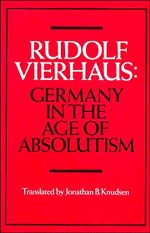4 - Political Organization
Published online by Cambridge University Press: 05 June 2012
Summary
PRELIMINARY REMARKS: THE ESTATES SYSTEM AND ABSOLUTE MONARCHY
The estates and absolute monarchy are two of the structural elements in the older European political system. The estates system does not refer to the general division of society into social estates but presumes it; the term instead encompasses the institutional network of local and regional selfgovernment and signifies the participation of the ruled in government. In Germany the imperial and territorial diets come first to mind; these made up the upper stratum of corporate institutions, in the same manner that the emperor and the territorial lords made up the upper stratum of sovereign authority. The individual members of the imperial estates, however, were also themselves territorial lords, the members of the territorial estates seigneurial lords. The difference between the right to appear in the diets (Standschaft) and sovereign authority itself (Herrschaft) cannot easily be derived from different communal and sovereign principles. The territorial lord did not have a monopoly over sovereign authority within his own lands that might have made the ruled into subjects; but neither did the territorial diets actually represent the entire population.
Estatist institutions, notions, and practices shaped social life in old Europe in the most diverse ways. It was in the nature of the estatist world that sovereign lords had a claim to political offices, that substantial local and regional functions in administration, law, and finance were controlled by resident lords, that the territorial lords were limited in their choice of officeholders, and, as a special case, that similar limits were placed on urban government.
- Type
- Chapter
- Information
- Germany in the Age of Absolutism , pp. 87 - 115Publisher: Cambridge University PressPrint publication year: 1989



